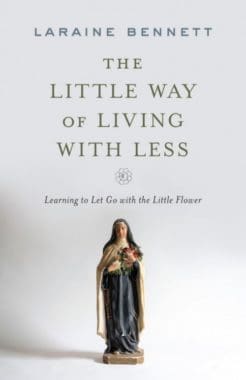Wisdom of St. Thérèse
“No, there is no joy comparable to that which the truly poor in spirit experience.”
Thérèse was acutely aware of the transient nature of material things and of the impermanence of this present life. Even at a very young age she understood that even those who believe themselves to be good Christians can be overly entranced by the world. Consider this passage from Story of a Soul, part of which we read in an earlier chapter:
I think it is a great grace that we left Alençon, as our friends there were too worldly and too clever at mixing the pleasures of the world with the service of God. They scarcely gave a thought to death, and yet death has called many of the people I knew and they were young and rich and happy. I like to think of the charming surroundings in which they lived and to wonder where they themselves are now and of what use to them are their chateaux and their gardens where I saw them enjoying the good things of life.
Can we be similarly focused and strive to attain poverty of spirit? Or are we satisfied with “mixing the pleasures of the world with the service of God”? Just as Thérèse learned to give up her self-centered and sensitive ways in order to become mature enough to enter Carmel, we too can learn to detach from our material possessions and our worldly obsessions. Thérèse gives us the clue when she reminds us of the inevitability of our death—death spares no one.
When she was a young novice, St. Thérèse gained a profound spiritual insight from an ordinary experience. She discovered that one of the other sisters had mistakenly taken her lamp. She was not able to ask for it because it was during the time of Great Silence. She was forced to spend an hour in pitch darkness. Yet Thérèse gleans spiritual lessons from this ordinary, frustrating experience. “Instead of feeling annoyed at being thus deprived of it, I was really happy, feeling that Poverty consists in being deprived not only of agreeable things but of indispensable things too. And so in this exterior darkness, I was interiorly illumined!”
Thérèse’s attention to the very small details gives rise to her profound insight that being poor in spirit also includes the voluntary (and joyful) renunciation of even those things we deem absolutely essential! This prompts us to consider that we, too, might look for simple ways to give a little more of ourselves, even to the point where it hurts, like the Widow in Mark 12:41–45. Perhaps donate more money than we had set aside to give to the Church or to the poor—even knowing that our money may not always be spent exactly as we would like. Or perhaps when someone asks us to have coffee and it really cuts into our busy schedule, we make the sacrifice to spend that time. And sometimes just a simple smile and nod of encouragement is just what a grouchy, annoying co-worker needs!
On another occasion, Thérèse felt inspired to help a grumpy, elderly, hard-to-please nun. Thérèse offered to leave her evening prayers to bring the elderly nun to the refectory. She could do nothing right for the old woman: she complained that Thérèse was moving either too quickly or too slowly, the old nun would fear she was falling, and she thought the young novice was far too young to care for her. Yet always Thérèse would offer her sweetest smile—and eventually won over the elderly nun.
One winter evening I was as usual doing the humble task I have just described. It was cold and dark. Suddenly I heard away in the distance the music of a small orchestra and I pictured to myself a richly furnished and decorated drawing room, glowing with light and containing fashionably dressed young women exchanging worldly compliments. Then I looked at the poor invalid I was guiding along. Instead of music, I heard her pitiful complaints; instead of elegant decoration, I saw the bare bricks of our cloister in a faint glimmer of light. . . . Our Lord poured on it that light of truth which so outshines the false glitter of earthly pleasures that I would not have given up the ten minutes it took for me to perform my act of charity in exchange for a thousand years of such worldly parties.
St. Thérèse saw in a moment the stark contrast between the fashionable, worldly life of pleasure and the bare bricks of her cloister with the plaintive cries of the invalid. She understood that the former was a perishable, “false glitter,” while her own life was spent in search of that true happiness, true peace, and everlasting joy that would be found in Heaven. And the Kingdom of Heaven begins, like the tiniest mustard seed or the hidden leaven, unseen within our hearts.
One of the ways we can retain our focus on what truly matters and ignore the “false glitter” is to remind ourselves that we are destined for eternal bliss together with the Holy Trinity in Heaven. As Thérèse wrote,
Ah! what peace floods the soul when someone rises above natural feelings. No there is no joy comparable to that which the truly poor in spirit experience. If such a one asks for something with detachment, and if this thing is not only refused but one tries to take away what one already has, the poor in spirit follow Jesus’ counsel: “If anyone take away your coat, let go your cloak also.”
From the Organizer
Someone, at some point, will have to deal with
your stuff—whether it’s you or those tasked with
clearing out your space after you’ve passed on.
—Jacquelyn Dupuy
+
This article is adapted from a chapter in The Little Way of Living with Less by Laraine Bennett which is available from Sophia Institute Press.
Art for this post: Cover and featured image used with permission.





